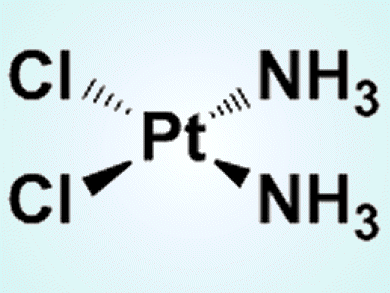Cisplatin is a drug commonly used in cancer chemotherapy as it kills tumor cells by damaging their DNA. Nevertheless, tumor cells often evolve mechanisms to repair or tolerate DNA damage, thereby becoming resistant to cisplatin (pictured) treatment.
Xiaoyang Xu, Harvard Medical School, Boston, USA, and colleagues developed a technology that co-delivers a cisplatin prodrug (cis,cis,trans-[Pt(NH3)2Cl2(O2C(CH2)8CH3)2]) and small interfering RNA (siRNA), namely double-stranded RNA molecules impairing the repair of damaged DNA. In order to reach this aim, the scientists self-assembled a biodegradable poly(lactide-coglycolide)-β-poly(ethylene glycol) diblock copolymer with a cationic lipid-like molecule that can efficiently bind siRNA through electrostatic interactions.
By using this strategy, the researchers obtained novel hybrid nanoparticles that delivered both siRNA molecules and the cisplatin prodrug to tumor cells. As a consequence, when administered to cancer-bearing mice, these nanoparticles efficiently inhibited tumor growth
- Enhancing tumor cell response to chemotherapy through nanoparticle-mediated codelivery of siRNA and cisplatin prodrug,
X. Xu, K. Xie, X.-Q. Zhang, E. M. Pridgen, G. Y. Park, D. S. Cui, J. Shi, J. Wu, P. W. Kantoff, S. J. Lippard, R. Langer, G. C. Walker, O. C. Farokhzad,
Proc. Nat. Acad. Sci. USA 2013.
DOI: 10.1073/pnas.1303958110




